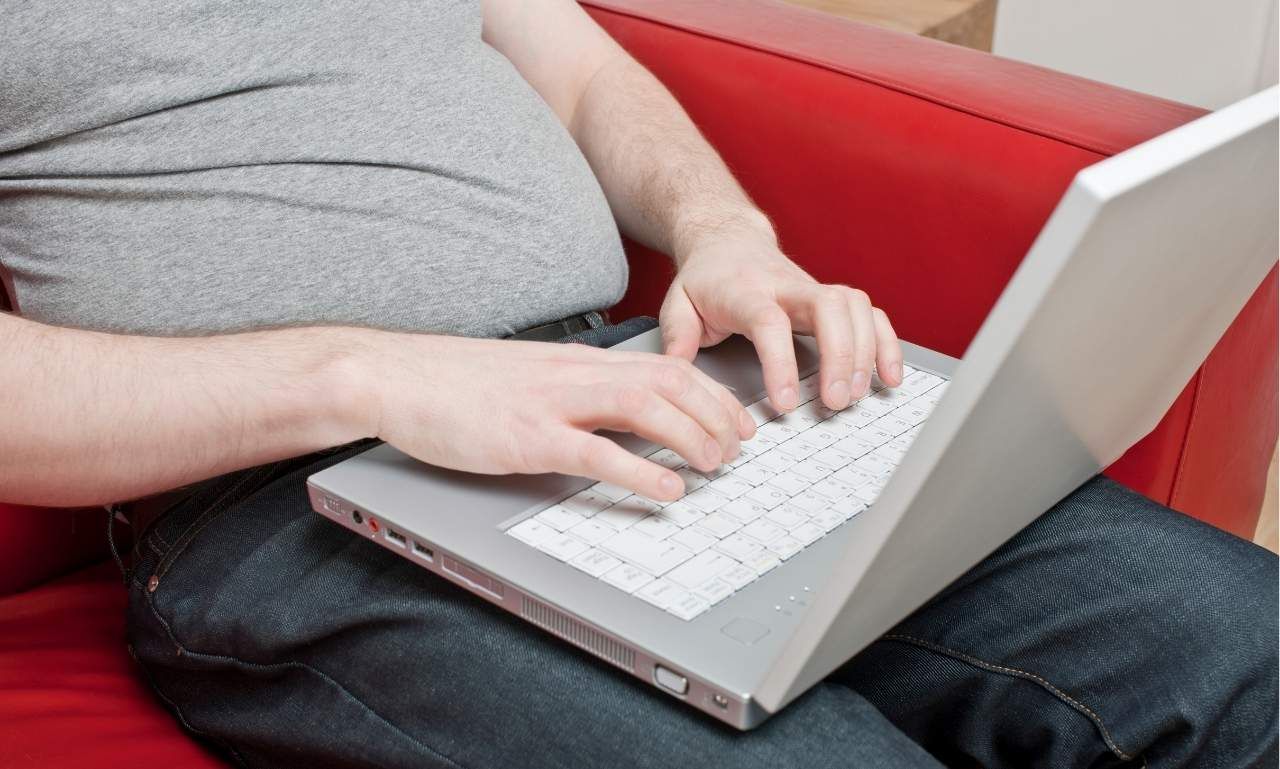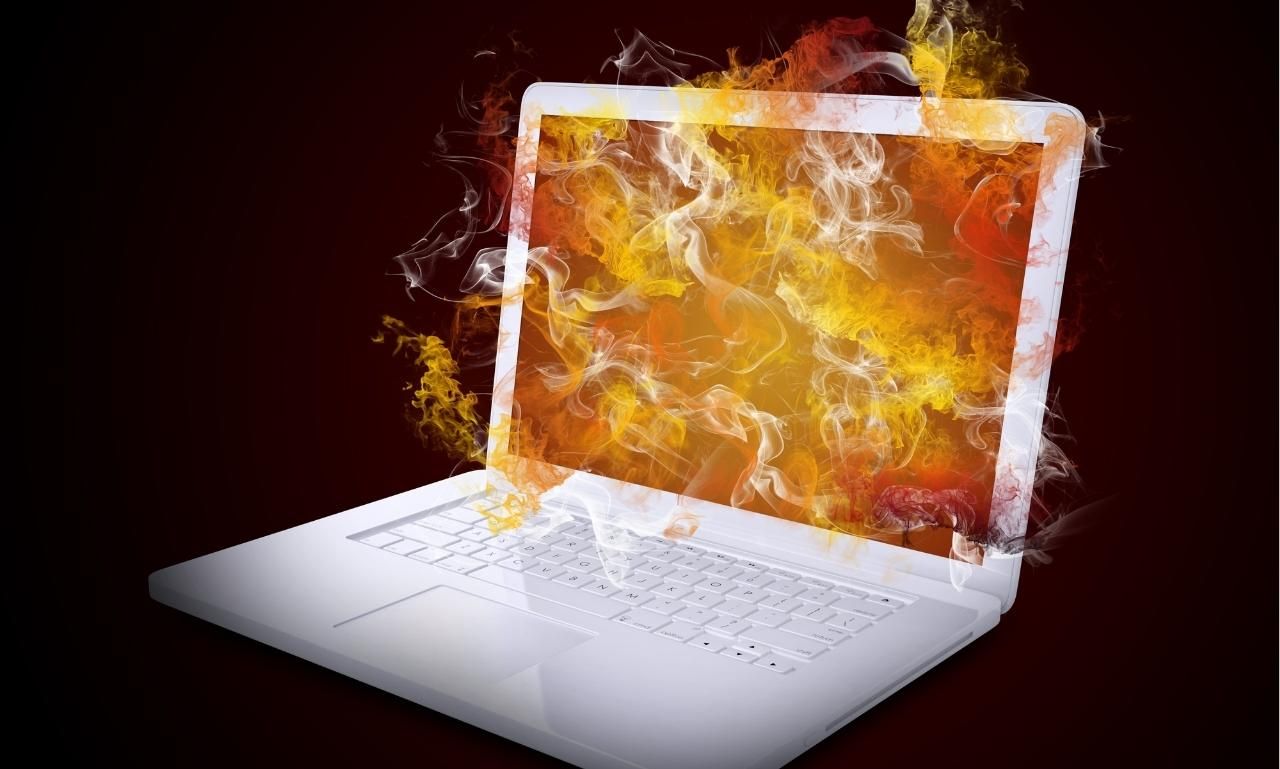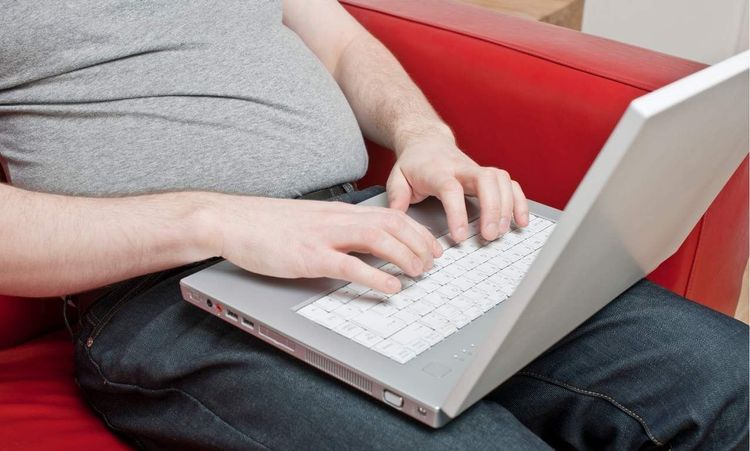Laptops are an essential part of our daily lives. They offer convenience, portability, and the ability to work from almost anywhere. But what happens when you place your laptop on your lap for extended periods?
Although it may appear harmless, using a laptop on your lap for extended periods can affect your health. Let me explain the potential risks of placing your computer on your lap. These include reproductive health issues, skin burns, and radiation exposure. We'll also provide some safer alternatives to avoid these risks while enjoying the benefits of using your laptop.
What Happens When You Place Your Laptop on Your Lap?

When using your laptop on your lap, the heat generated is transferred to your body, particularly around the thighs and groin. Laptops have internal components that generate heat during use, such as the processor, which requires effective cooling mechanisms. A computer placed directly on your lap prevents heat from dissipating efficiently, increasing temperature.
This increase in heat in sensitive body areas can lead to a range of health problems. The effects may not be immediate, but over time can result in significant health issues. These issues can affect different aspects of your body, including your skin, reproductive organs, and overall well-being.
It Can Harm Your Reproductive Organs
One of the primary concerns regarding laptop use on your lap is its potential to affect your reproductive health. Specifically, the heat emitted by the laptop can raise the temperature of the scrotal area. This is a significant concern for men, as the scrotum is naturally designed to maintain a temperature slightly cooler than the rest of the body for optimal sperm production.
Elevated scrotal temperatures caused by prolonged laptop use on the lap can negatively affect sperm quality. Research has shown that exposure to increased temperatures can reduce sperm motility and count and even cause DNA fragmentation in sperm. The study of Mata A and Schulsinger D established that higher scrotal temperatures result in decreased sperm motility as a single direct issue affecting male fertility.
Long-term heat exposure can result in human sperm DNA fragmentation together with sperm quality deterioration. When men place laptops on their laps, it can cause fertility problems because sperm become less able to fertilize eggs. You should evaluate the possible pregnancy complications when you want to have a child because putting your laptop directly on your lap regularly could lead to health risks.
It Can Lead to Certain Types of Cancer
The link between laptop use and cancer is still being studied, but there are concerns about the exposure to electromagnetic fields (EMF) emitted by laptops. Like many electronic devices, laptops emit non-ionizing radiation, unlike the ionizing radiation commonly associated with cancer. Non-ionizing radiation doesn't have enough energy to remove electrons from atoms, but it may still have biological effects with prolonged exposure.
While there is no conclusive evidence linking laptop radiation to cancer, some studies suggest that prolonged exposure to electromagnetic radiation could increase the risk of developing certain types of cancer, particularly brain tumours. The radiation emitted by laptops is weak compared to cell phones. Still, the concern is that when a laptop is placed on the lap, the radiation comes into direct contact with the body, increasing potential health risks.
Additionally, radiation exposure concerns those who use laptops regularly and those who use them on their laps. The closer you are to the source of radiation, the greater the potential exposure. As laptops are often used for hours on end, this raises questions about the long-term effects of this exposure on human health.
It Can Lead to Pregnancy Issues
For women, using a laptop on the lap could pose risks during pregnancy. The heat from the laptop can affect the developing fetus, particularly in the first trimester, when the baby's organs are forming. Elevated temperatures in the abdominal region can be harmful to fetal development, and radiation exposure may also pose risks to the unborn child.
Research about this topic remains scarce, but doctors advise pregnant women to keep laptops away from their abdominal area. The device heat can damage developing babies in the womb, which results in more pregnancy complications. Exposure to electromagnetic radiation that continues over time may disrupt normal fetal growth during development.
Pregnant women should be cautious about prolonged laptop use on their lap and consider using alternative working methods, such as using the laptop on a desk or table.
It Can Burn Your Skin
In addition to internal health risks, using a laptop on your lap can physically damage your skin. Laptops generate significant heat, and when placed directly on the skin, they can cause skin irritation, burns, or even permanent scarring. One condition known as "toasted skin syndrome" or erythema ab igne occurs when skin becomes discolored and damaged from prolonged heat exposure.
Toasted skin syndrome appears as a reddish-brown discoloration of the skin, which can become permanent if the laptop continues to generate heat in contact with the skin. This condition is often caused by repeated exposure to heat from devices like laptops. The risk is higher when laptops are used on soft surfaces such as beds or couches, where the air vents can be obstructed, leading to excessive heat buildup.
Toasted skin syndrome appears as a reddish-brown discoloration of the skin, which can become permanent if the laptop continues to generate heat in contact with the skin. Repetitive heat exposure to devices, including laptops, produces this condition. The risk of laptop heat injury rises significantly when users place their devices on soft surfaces such as beds or couches because blocked air vents allow heat to build up dangerously.
Laptop overheating leads to quick skin burns. Your skin reacts differently to laptop heat temperatures based on device temperature and skin exposure duration. Skin burns can develop regardless of how hot the laptop remains.
Do Laptops Emit Radiation?

Laptops emit radiation, but it's important to distinguish between ionizing and non-ionizing radiation. Non-ionizing radiation, emitted as electromagnetic fields (EMF), is much weaker than ionizing radiation, which is associated with more serious health risks like cancer. Non-ionizing radiation, emitted as electromagnetic fields (EMF), does not have enough energy to ionize atoms or molecules, but it can still affect biological tissues in the long term.
When exposed for extended periods, scientists worry about the human body's response to non-ionizing radiation. The radiation output from laptops stands lower than radiation produced by cell phones and microwave ovens yet requires attention to usage safety. Your body will absorb more radiation when the laptop sits close to your body, especially when you place it on your lap. Experts recommend you should not keep your laptop directly on your lap because of health risks that can develop from prolonged use.
Thermal Effects of Using a Laptop on Your Lap
Laptops are designed for portability, but they are not always designed with optimal heat dissipation in mind. As laptops process information, their internal components, such as the processor, generate heat. This heat is typically released through the device's air vents. However, when a laptop is placed on a soft, insulating surface like your lap, the heat cannot dissipate efficiently, resulting in a buildup of thermal energy.
The heat generated by the laptop can raise the temperature of your skin significantly, leading to discomfort and potential damage. The skin on your lap, particularly around the groin area, is sensitive to heat and can suffer from burns or irritation if exposed to the high temperatures generated by the laptop. Over time, repeated exposure to excessive heat can lead to more severe health issues, especially in the case of young or sensitive individuals.
4 Safer Alternatives to Using Your Laptop on Your Lap
To minimize the risks associated with using your laptop on your lap, here are four safer alternatives to consider:
1. Use Your Laptop on a Desk or Table

Placing your laptop on a desk or table remains the most basic and secure method to replace lap usage. A stable surface from the laptop desk allows better component cooling while providing a safe area for your laptop. Laptops should be placed on a desk or tabletop position correctly for ergonomic alignment, which decreases your risk of muscular skeletal injuries affecting your neck and back. A flat surface placement allows your laptop vents to operate correctly, which helps prevent overheating.
2. Laptop Lap Desk
A laptop lap desk is a portable solution designed to make laptop use on your lap safer. These desks are equipped with cooling pads and additional air circulation space, helping prevent the laptop from overheating. Laptop lap desks provide a stable surface for your laptop, allowing you to work comfortably without direct contact with your skin. They are also designed to keep the laptop safe from your body.
3. Laptop Lap Tray
The laptop lap desk is a mobile device that protects your lap while operating your laptop. Laptop lap desks feature built-in cooling pads, which work with extra ventilation space to maintain laptop temperatures within safe ranges. Laptop lap desks create a stable platform for your laptop, enabling comfortable work while keeping your device off your skin. The design of these devices positions the computer away from your body for safety reasons.
4. Laboratory-Tested SYB Laptop Pad
A laboratory-tested SYB laptop pad provides radiation protection, making it suitable for those who want to minimize their exposure to radiation. The pads are designed to protect users by forming a shield that blocks electromagnetic radiation between the user and the laptop. The materials in SYB laptop pads block radiation, which helps protect users from the non-ionizing radiation from their laptops. The SYB laptop pad offers a safe alternative to regular laptop use on laps, particularly for users who worry about EMF exposure.
Conclusion
Using a laptop directly on your lap can cause three severe health issues, including reproductive organ damage alongside skin burns and potential radiation exposure problems. Regular lap-based laptop use requires attention to health risks to protect yourself effectively.
When you place your laptop on a desk or table surface, its safety becomes optimal. To minimize radiation exposure and enhance comfort, you can use laptop lap desks or trays or invest in laboratory-tested laptop pads. Your laptop portability remains intact when you adopt these minor modifications to reduce health threats.
Also Read: What is the Latest Laser Eye Technology?




